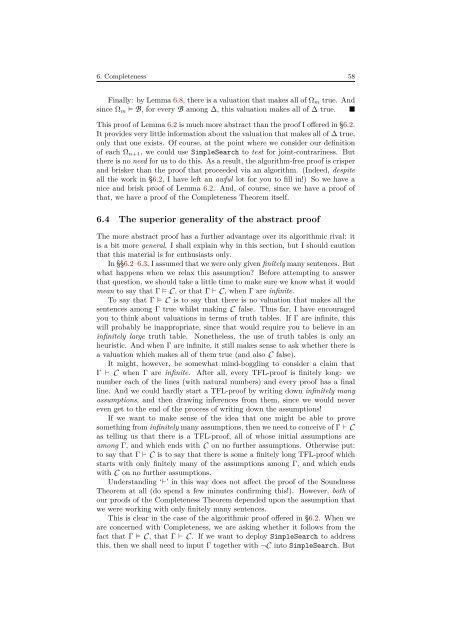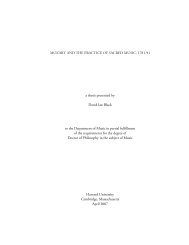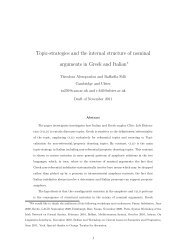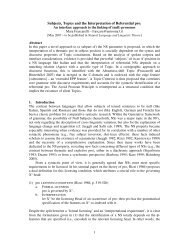Metatheory - University of Cambridge
Metatheory - University of Cambridge
Metatheory - University of Cambridge
You also want an ePaper? Increase the reach of your titles
YUMPU automatically turns print PDFs into web optimized ePapers that Google loves.
6. Completeness 58<br />
Finally: by Lemma 6.8, there is a valuation that makes all <strong>of</strong> Ω m true. And<br />
since Ω m ⊨ B, for every B among ∆, this valuation makes all <strong>of</strong> ∆ true. ■<br />
This pro<strong>of</strong> <strong>of</strong> Lemma 6.2 is much more abstract than the pro<strong>of</strong> I <strong>of</strong>fered in §6.2.<br />
It provides very little information about the valuation that makes all <strong>of</strong> ∆ true,<br />
only that one exists. Of course, at the point where we consider our definition<br />
<strong>of</strong> each Ω n+1 , we could use SimpleSearch to test for joint-contrariness. But<br />
there is no need for us to do this. As a result, the algorithm-free pro<strong>of</strong> is crisper<br />
and brisker than the pro<strong>of</strong> that proceeded via an algorithm. (Indeed, despite<br />
all the work in §6.2, I have left an awful lot for you to fill in!) So we have a<br />
nice and brisk pro<strong>of</strong> <strong>of</strong> Lemma 6.2. And, <strong>of</strong> course, since we have a pro<strong>of</strong> <strong>of</strong><br />
that, we have a pro<strong>of</strong> <strong>of</strong> the Completeness Theorem itself.<br />
6.4 The superior generality <strong>of</strong> the abstract pro<strong>of</strong><br />
The more abstract pro<strong>of</strong> has a further advantage over its algorithmic rival: it<br />
is a bit more general. I shall explain why in this section, but I should caution<br />
that this material is for enthusiasts only.<br />
In §§6.2–6.3, I assumed that we were only given finitely many sentences. But<br />
what happens when we relax this assumption? Before attempting to answer<br />
that question, we should take a little time to make sure we know what it would<br />
mean to say that Γ ⊨ C , or that Γ ⊢ C , when Γ are infinite.<br />
To say that Γ ⊨ C is to say that there is no valuation that makes all the<br />
sentences among Γ true whilst making C false. Thus far, I have encouraged<br />
you to think about valuations in terms <strong>of</strong> truth tables. If Γ are infinite, this<br />
will probably be inappropriate, since that would require you to believe in an<br />
infinitely large truth table. Nonetheless, the use <strong>of</strong> truth tables is only an<br />
heuristic. And when Γ are infinite, it still makes sense to ask whether there is<br />
a valuation which makes all <strong>of</strong> them true (and also C false).<br />
It might, however, be somewhat mind-boggling to consider a claim that<br />
Γ ⊢ C when Γ are infinite. After all, every TFL-pro<strong>of</strong> is finitely long: we<br />
number each <strong>of</strong> the lines (with natural numbers) and every pro<strong>of</strong> has a final<br />
line. And we could hardly start a TFL-pro<strong>of</strong> by writing down infinitely many<br />
assumptions, and then drawing inferences from them, since we would never<br />
even get to the end <strong>of</strong> the process <strong>of</strong> writing down the assumptions!<br />
If we want to make sense <strong>of</strong> the idea that one might be able to prove<br />
something from infinitely many assumptions, then we need to conceive <strong>of</strong> Γ ⊢ C<br />
as telling us that there is a TFL-pro<strong>of</strong>, all <strong>of</strong> whose initial assumptions are<br />
among Γ, and which ends with C on no further assumptions. Otherwise put:<br />
to say that Γ ⊢ C is to say that there is some a finitely long TFL-pro<strong>of</strong> which<br />
starts with only finitely many <strong>of</strong> the assumptions among Γ, and which ends<br />
with C on no further assumptions.<br />
Understanding ‘⊢’ in this way does not affect the pro<strong>of</strong> <strong>of</strong> the Soundness<br />
Theorem at all (do spend a few minutes confirming this!). However, both <strong>of</strong><br />
our pro<strong>of</strong>s <strong>of</strong> the Completeness Theorem depended upon the assumption that<br />
we were working with only finitely many sentences.<br />
This is clear in the case <strong>of</strong> the algorithmic pro<strong>of</strong> <strong>of</strong>fered in §6.2. When we<br />
are concerned with Completeness, we are asking whether it follows from the<br />
fact that Γ ⊨ C , that Γ ⊢ C . If we want to deploy SimpleSearch to address<br />
this, then we shall need to input Γ together with ¬C into SimpleSearch. But
















